After eight consecutive seasons in September wilderness, five of them resulting in bottom-four finishes, Richmond began the decade looking to put perhaps their most unsuccessful period behind them.
With a new coach in former Essendon and Port Adelaide hard man Damien Hardwick, the Tigers were dismal in their start to 2010, losing their opening nine games by an average of 52 points. It drew comparisons to how Fitzroy were performing in their final years, but an improvement in form saw Richmond avoid claiming another wooden spoon.
The Tigers took their late-season form into the 2011 campaign, creeping higher on the ladder. More wins came in 2012, with Richmond among the pack of teams to finish just outside the top eight. With 15 victories in 2013, the Tigers finally broke a 12-year finals drought, taking on fierce rivals Carlton in an elimination final in front of over 94,000 fans at the MCG. Despite leading by five goals in the third term, Richmond were beaten by a resurgent Blues outfit who only qualified for September due to Essendon’s relegation because of their supplements scandal.
The Tigers took the finals loss hard, sitting 15th on the ladder with just three wins heading into Round 15 of the 2014 campaign. However, with a stunning nine-win run, Richmond qualified for the finals for a second consecutive year, this time hitting the road to take on Port Adelaide. With all of their petrol tickets spent, the Tigers were obliterated by the Power, sent packing by 57 points. They enjoyed a more settled season in 2015, reaching yet another finals series. Taking on the eighth-placed North Melbourne, Richmond saw an early lead evaporate as they were overtaken by the fresh legs of the Kangaroos, knocking them out of the opening week of the finals for a third consecutive season.
With pressure continuing to mount on the success-starved Tigers, Hardwick came perilously to losing his job in 2016 as his side struggled to just eight wins for the year. Given the vote of confidence heading into 2017, the Tigers played with more freedom, helped by a breakout season of star midfielder Dustin Martin. Richmond finished in the top four for the first time since 2001, finally breaking their run of failure in September with a win over Geelong in the qualifying final. With a parochial home crowd behind them in the preliminary final, the Tigers cruised to their first grand final in 35 years. Matched up against the minor premiers Adelaide, the Tigers went into the game underdogs, but a dominant second half delivered the long-awaited premiership cup back to Punt Road.
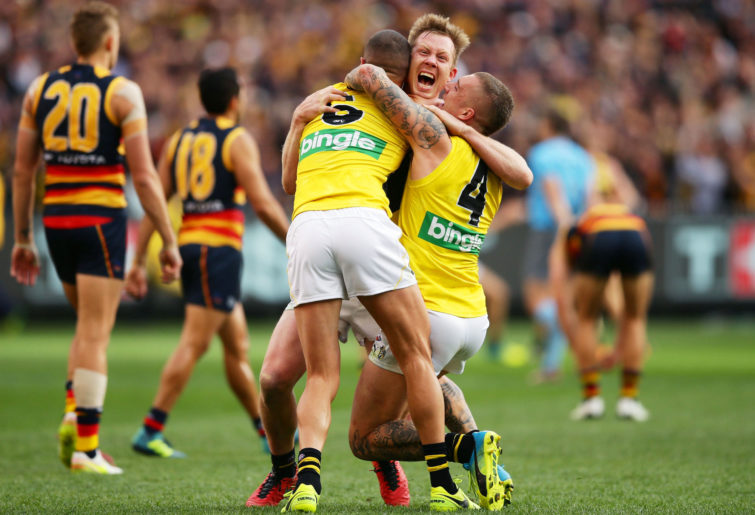
(Photo by Matt King/AFL Media/Getty Images)
The confidence gained from taking out the flag spurred Richmond on to a brilliant 2018 season, finishing on top of the ladder for the first time since 1982. After winning through to another preliminary final, the Tigers were handed a rude shock in their match-up against the less fancied Collingwood, who caused a major upset to win by 39 points. Richmond’s quest for redemption looked in tatters early in 2019, with champion defender Alex Rance tearing his ACL in the opening round of the season. Further injuries to key players such as captain Trent Cotchin and three-time Coleman Medallist Jack Riewoldt put their premiership aspirations in serious doubt, with the Tigers slipping out of the top eight after Round 14. However, an 11-game unbeaten run saw Richmond storm into another grand final, this time facing the GWS Giants. With over 100,000 packed into the MCG, the Tigers brushed the Giants aside in one of the most one-sided premiership deciders the game has ever seen, with Richmond securing their 12th premiership. With two flags over three years and a membership base in excess of 100,000, the Tigers were a bona fide juggernaut as they finished the decade.
Best wins
Qualifying final, 2017 – Richmond 13.13.91 beat Geelong 5.10.40 (MCG)
Having failed to advance past the first week of the finals in every year between 2013 and 2015, the weight of the world was squarely on the shoulders of all Richmond players and coach Damien Hardwick as they entered the 2017 finals campaign. The pressure was magnified even more so, given they were coming up against a Geelong outfit that the Tigers had not beaten in over 11 years. After kicking the first three goals, the Tigers held a slender nine-point advantage in a low-scoring slog at the main break. A dominant second half, highlighted by a seven-goal final term, delivered Richmond’s first win in a final since 2001, also sending the Tigers through to a home preliminary final.
Grand final, 2017 – Richmond 16.12.108 beat Adelaide 8.12.60 (MCG)
After winning their way into their first grand final in 35 years, the Tigers started slight outsiders against the top-of-the-ladder Adelaide Crows. Having fallen behind by 13 points early in the second term, Richmond quickly took control of the match thanks to a seven-goal burst that effectively killed off the contest. Richmond cruised to a 48-point win, their first premiership since 1980, with celebrations on Punt Road continuing for days on end.
Grand final, 2019 – Richmond 17.12.114 beat Greater Western Sydney 3.7.25 (MCG)
After the pain of missing out on back-to-back grand final appearances, the Tigers made a swift return back to the big dance, albeit after an incredibly trying season littered with injuries to key personnel. This time, Richmond went into the game warm favourites, taking on a GWS Giants side who won their way through to the grand final from sixth position. Following a slow start to the match, the Tigers took a 35-point lead into halftime. That blew out to over ten goals by the final change, with the Giants having no answer for Richmond’s pressure and skill. With a strong final term, the Tigers claimed their 12th premiership by a whopping 89 points, ensuring they finished the decade as the team to beat going into the 2020s.
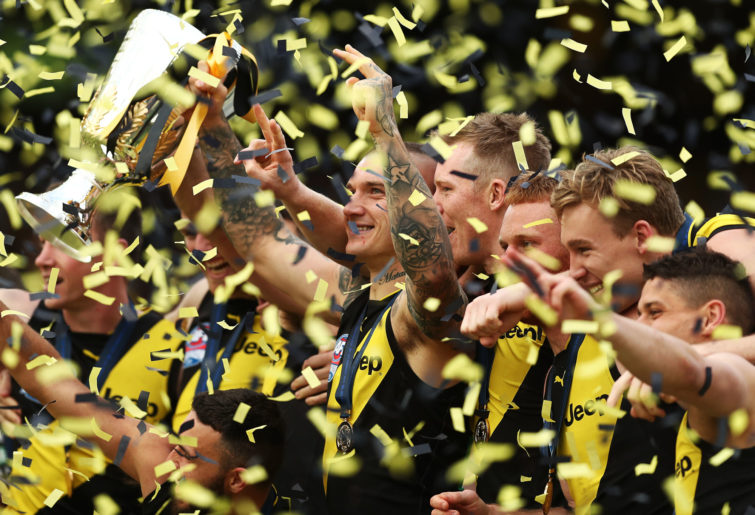
(Mark Metcalfe/AFL Photos/via Getty Images )
Worst losses
Round 16, 2012 – Gold Coast 13.14.92 beat Richmond 13.10.88 (Cazaly’s Stadium)
Teetering on the brink of the top eight, Richmond entered their Round 16 clash with the winless Gold Coast Suns expecting to chalk up an important victory. The Suns weren’t playing to script, kicking seven of the first nine goals to lead by 36 points late in the second quarter. The Tigers finally found their spark, eventually taking the lead by three goals approaching time-on in the last term. A goal to Josh Caddy reduced the Richmond lead to ten points, but with ball in hand and just 45 seconds remaining on the clock, it seemed certain that it would be the eighth win for the season for the Tigers. However, a turnover resulted in a goal to Jarrod Harbrow, before the Suns quickly won the ball forward from the resultant centre clearance, ending in the arms of Karmichael Hunt. The rugby league convert calmly slotted the match-winning goal after the siren, with the Tigers snatching defeat from the jaws of victory – a result that all but ended their season.
Elimination final, 2014 – Port Adelaide 20.12.132 beat Richmond 11.9.75 (Adelaide Oval)
After a disastrous start to the season that saw Richmond sitting equal last on the AFL ladder after Round 14, the Tigers went on a barnstorming nine-win run to charge into the finals. Matched up against the Power at the Adelaide Oval, the in-form Tigers had a great opportunity to avenge their painful loss to Carlton on the same stage a year earlier. However, having spent all of their petrol tickets getting to the race, they were blown out the water, with Port taking advantage of captain Trent Cotchin’s surprise decision to kick into the wind after winning the coin toss. The Power slammed on 12 of the first 13 goals, leading by as much as 82 points late in the third quarter. Richmond saved some face in the last quarter, but the 57-point defeat was a bitter end to what was a rollercoaster season for the yellow and black army.
Preliminary final, 2018 – Collingwood 15.7.97 beat Richmond 8.10.58 (MCG)
After brushing aside Hawthorn to win through to a home preliminary final, the Tigers took on fierce rivals Collingwood, who had failed to beat the Tigers in their two outings that season. However, the Magpies were inspired by American forward Mason Cox, kicking ten goals to two in a stunning first half to lead by 44 points at the main break. The Tigers attempted to fight their way back into the contest, but Collingwood would ultimately steady and win through to the grand final, breaking the hearts of the Richmond faithful.
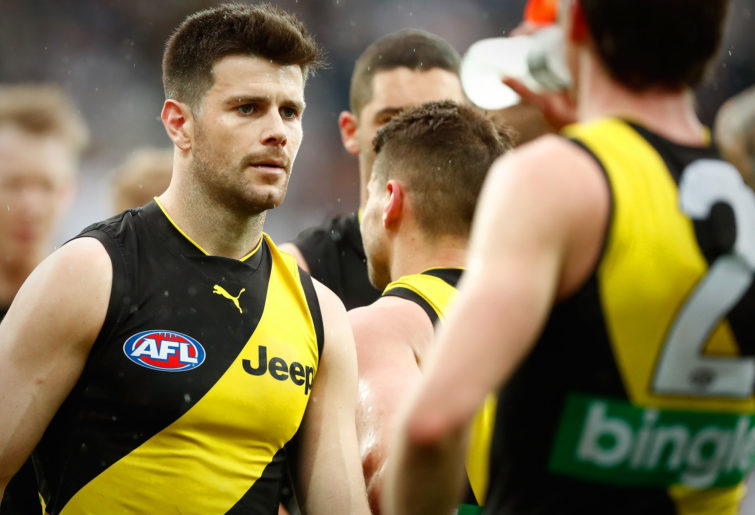
(Photo by Adam Trafford/AFL Media/Getty Images)
Moments that shaped the club
Worse than Fitzroy
After a horrific start to Damien Hardwick’s coaching tenure in 2010, Richmond’s plight was compared to that of Fitzroy, who perished after merging with the Brisbane Bears in 1996 in the midst of severe financial complications and declining on-field performance. After a five-win campaign in 2009 that saw Terry Wallace lose his job, Richmond lost their opening nine matches of 2010 by an average of 52 points. With the pressure mounting, the Tigers were able to alleviate some of that with six wins from their next nine matches, including a four-game winning stretch. Richmond eventually came out of the September wilderness in 2013.
Board challenge
Richmond’s 2016 campaign was an unmitigated disaster. Having lost three consecutive elimination finals to Carlton, Port Adelaide and North Melbourne, the Tigers entered the season hoping to finally break their September duck, having not enjoyed success in finals since the Danny Frawley years in 2001. Instead, Richmond won just eight matches for the season as they slumped to 13th on the ladder, finishing the year with an 88-point loss and a 113-point thrashing among their final five games of the campaign. This put immense pressure on coach Damien Hardwick, who held a 47.7 per cent winning record after seven seasons. A supporters group named Focus On Footy was formed in the aim of creating a spill on the Richmond board, featuring former premiership Tigers Bruce Monteath and Bryan Wood. The group demanded action, however they didn’t call for Hardwick’s head, instead urging him to come up with a new game plan after a failed season. After calling for the return of Neil Balme to the club, the former premiership player was named the new general manager of football ahead of the 2017 season. Only 16 days after announcing their intention to overthrow the Richmond board, the Focus on Footy group withdrew their challenge.
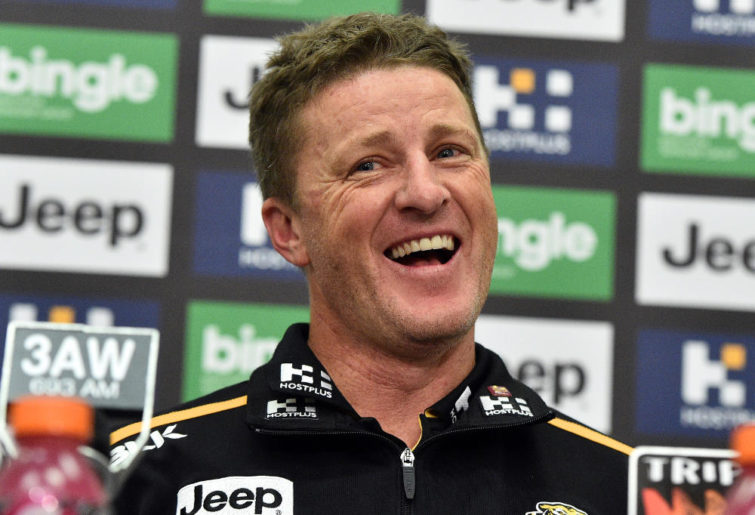
(AAP Image/Julian Smith)
Premiership success
The decision to give Hardwick one more chance to lead Richmond out of the mire after their disastrous 2016 campaign looked like an inspired one early in 2017, with the Tigers winning their opening five matches of the season for the first time since 1995. With superstar midfielder Dustin Martin taking his game to extraordinary levels, he propelled the Tigers to a top-four finish. After winning through to their first grand final in 35 years, Richmond beat the Adelaide Crows to end a 37-year premiership drought. After a dominant 2018 campaign, the Tigers fell at the final hurdle before the premiership decider, losing to Collingwood in the preliminary final. With the recruitment of Gold Coast captain Tom Lynch in the off-season, the Tigers boasted one of the most potent forward lines heading into 2019. However, after a spate of injuries to key players early in the season, including key defender Alex Rance and three-time Coleman Medallist Jack Riewoldt, hopes of a second premiership in three years seemed fanciful. But a resurgence in form in the second half of the season had the Tigers in the box seat for a 12th flag, and after coming from behind to defeat Geelong in the preliminary final, they would take on the GWS Giants on the last Saturday of September. In one of the most dominant performances by any side in a grand final, Richmond barely broke a sweat as they finished the decade with an exclamation mark.
Best 22
Back pocket – Dylan Grimes
After making his debut in the final round of the 2010 season, Grimes rose to prominence in 2011 before a severe hamstring injury saw him miss the second half of the season. After making his return in 2012, Grimes was again forced back on the sidelines, aggravating the hamstring on two separate occasions. After a trip to Germany for rehab, Grimes suffered more injury woes in 2013, his first year in the Richmond leadership group. He returned to play in the Tigers’ elimination final against Carlton, enjoying better luck with his body from there on. Grimes finished in the top ten of the Jack Dyer Medal for the first time in 2015, something he would repeat in each remaining year of the decade, including three consecutive top-five placings. The two-time premiership backman took his game to a new level in 2019, resulting in an All Australian berth. After 151 games in the decade, Grimes is not only one of Richmond’s most reliable defenders, but is regarded league-wide as arguably the most versatile defensive-50 player.
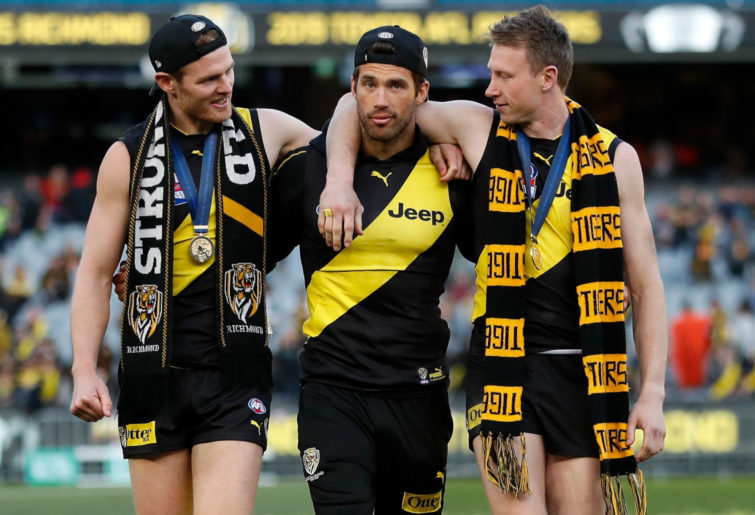
David Astbury, Alex Rance and Dylan Grimes formed a formidable defence. (Photo by Michael Willson/AFL Photos via Getty Images)
Fullback – David Astbury
He is another tall Tiger who endured injury troubles at the beginning of his career. Touted as a future forward, Astbury made a name for himself as an adept defender, but an array of injury complications, including two separate patella issues, saw him play just 41 games in his first six seasons. However, he enjoyed some much deserved luck in 2016, playing a career-best 19 games. He featured in every match of Richmond’s premiership campaign in 2017, before becoming a two-time flag winner in 2019, a year in which he placed in the top ten of the club best and fairest for the first time.
Back pocket – Nick Vlastuin
A highly rated defender with outstanding leadership capabilities, Vlastuin was drafted to the Tigers as a top-ten selection in 2012. He was named the club’s best first-year player in 2013 after 18 matches in his debut campaign. He was firmly entrenched in Richmond’s best side by his second season, before claiming his first top-ten finish in the Jack Dyer Medal in 2015. Vlastuin was earmarked for more midfield minutes over the next couple of seasons, but after a shoulder fracture in 2017 that saw him miss two months of action, he returned to his customary role in defence, playing a key role in Richmond’s premiership win. After another strong campaign in 2018, Vlastuin stepped up his game in the absence of Alex Rance in 2019, finishing fourth in the club best and fairest as the Tigers claimed another flag.
Halfback – Bachar Houli
After struggling to break into the senior line-up during four years at Essendon, Houli was traded to the Tigers, where he quickly became a regular. After his debut season in the yellow and black in 2011, Houli finished fourth in the Jack Dyer Medal. It would be the first of five consecutive top ten finishes in the award. After an injury-interrupted season in 2016, Houli bounced back with a strong campaign in 2017, culminating in a superb grand final performance where he was unlucky not to win the Norm Smith Medal. Injury struck Houli again in 2018, but he rebounded to have a career-best season in 2019, polling a career-high 11 Brownlow Medal votes and being one of the Tigers’ best in their premiership win over the Giants.
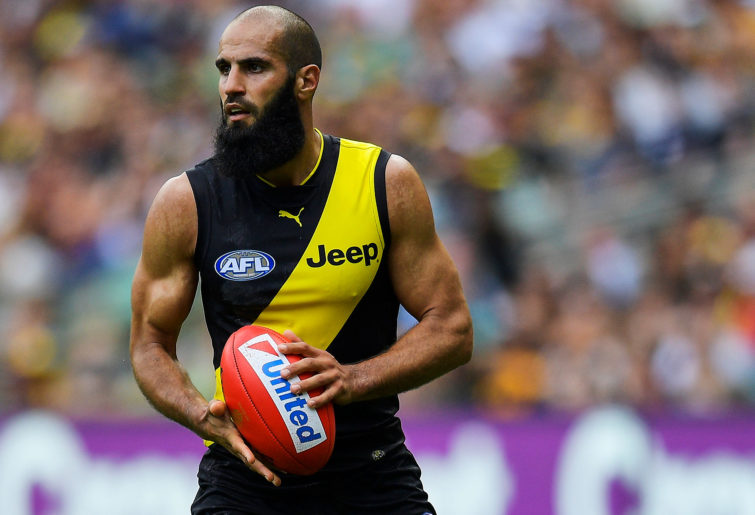
(Photo by Brett Hemmings/Getty Images)
Centre halfback – Alex Rance
One of the greatest defenders of the modern era, Rance began the decade as a fledgling tall who occasionally played up forward and even in the midfield. Rance broke out in 2011 and locked down a position in the Richmond defence. It resulted in his first top-ten finish in the Jack Dyer Medal. He repeated those efforts in both 2012 and 2013, before being named in the All Australian side in 2014. It would be the beginning of a remarkable run of form for Rance, going on to earn All Australian honours in four consecutive years as well as winning the Richmond best and fairest in 2015. In 2017, Rance was named vice-captain of the club, helping lead the side to their first premiership in 37 years. In the opening round of the 2019 season, Rance suffered a torn ACL, cruelly in his 200th game. Such was his importance to the Tigers’ line-up, pundits declared it a major blow to Richmond’s hopes of claiming a second flag. After failing to make it back in time to play in another premiership, Rance shocked the AFL world when he announced his retirement in December, departing the game as one of the best defenders the game has seen.
Halfback – Chris Newman
The captain of the Tigers at the start of the decade, Newman enjoyed a strong 2010 campaign, resulting in a runner-up finish in the Jack Dyer Medal. Newman relinquished the captaincy at the end of 2012, but continued to be a steady hand in the Richmond back half. In his 233rd career match, Newman played in his very first final, losing to Carlton in 2013. It would be the first of three consecutive finals campaign that Newman participated in, with the Tigers losing in the first week in each of them. At the end of 2015, Newman announced his retirement following 268 games, 114 of them coming in the decade.
Wing – Brandon Ellis
A first-round draft selection from 2011, Ellis quickly became entrenched in Richmond’s best 22, missing just three matches in his first six years on the list. An outstanding campaign in 2014 saw the midfielder finish second in the club best and fairest, following it up with another strong year in 2015. However, Ellis was criticised for his performance in that year’s elimination final, collecting just ten touches. Despite his form being down on his normal output during the 2017 finals series, Ellis became a premiership player in Richmond’s victory over the Crows. He fell out of favour a year later however, failing to feature in the club’s finals campaign. Ellis bounced back to become a two-time premiership player in 2019, however he departed the club as a free agent after 176 games.
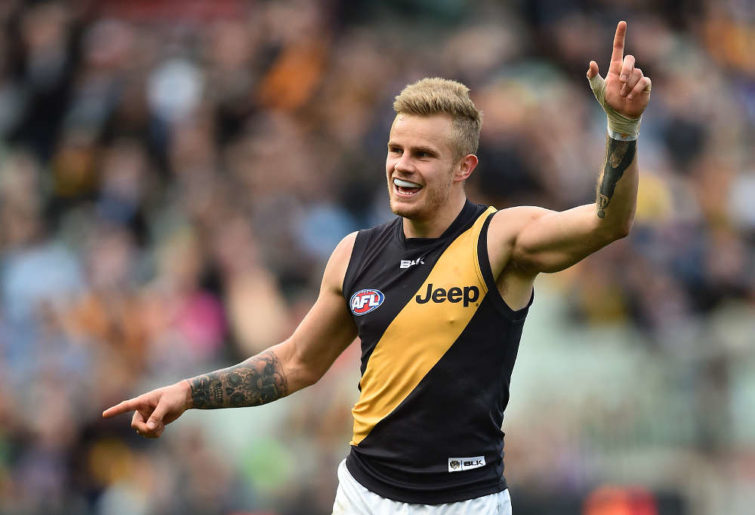
(AAP Image/Julian Smith)
Centre – Trent Cotchin
Prior to the 2010 season, the 19-year-old Cotchin was voted into the Richmond leadership group despite having played just 25 matches. After featuring in 17 games that year, Cotchin enjoyed a breakout campaign in 2011, claiming his first Jack Dyer Medal and polling 15 Brownlow Medal votes. He went to even greater heights in 2012, earning All Australian honours and being named the AFL Coaches Association’s Champion Player of the Year as he claimed back-to-back best and fairest awards. With 26 votes, Cotchin finished equal-second with Sam Mitchell in the Brownlow Medal count. However, years later both players would be awarded the medal after Jobe Watson was stripped of it due to his involvement in Essendon’s supplements scandal. Cotchin took the reins as Richmond captain in 2013, leading the club to their first finals campaign in 12 years. He won a third Jack Dyer Medal in 2014, but was widely criticised for his performance in Richmond’s elimination final loss to North Melbourne in 2015 – the club’s third consecutive failure in September. After battling calls for him to relinquish the captaincy, Cotchin bounced back to lead the Tigers to their first premiership since 1980. He was named the AFL Players Association’s best captain in 2018, before becoming a two-time premiership skipper in 2019. Cotchin finished the decade as one of the most decorated captains in Richmond history.
Wing – Shaun Grigg
After spending four inconsistent seasons with Carlton, Grigg was traded to Richmond at the end of 2010. He quickly became a regular member of the Tigers’ midfield, placing tenth in the Jack Dyer Medal in his first season in the yellow and black. He improved to a top-five finish a year later, polling a career-high 11 Brownlow Medal votes. In 2013, Grigg played a key role in Richmond’s return to September, but performed poorly in the elimination final against his former side Carlton. After an injury-interrupted 2014 campaign, Grigg responded with three solid seasons, making a name for himself as an undersized back-up ruckman, a role that helped take the Tigers to premiership success in 2017. Grigg made a selfless decision to retire early in the 2019 season after failing to get on the field due to persistent injuries. Grigg’s decision to bow out of his 171-game career with the Tigers allowed the club to recruit Marlion Pickett in the mid-season draft.
Half forward – Brett Deledio
The reigning Jack Dyer Medallist as the Tigers entered the decade, Deledio remained one of the club’s classiest players as Richmond embarked on a new era under Damien Hardwick. Deledio achieved top-five finishes in the best and fairest in each year between 2010 and 2014, including two runner-up placings. In 2012, Deledio was named in the All Australian side for the first time in his career, a feat he repeated in 2015. Deledio was named vice-captain of the club in 2013, holding that position until the end of an injury-interrupted year in 2016. After 137 games and 94 goals in the decade, Deledio was traded to the Giants that off-season, cruelly missing Richmond’s meteoric rise to premiership stardom.
Centre half forward – Jack Riewoldt
While the 2010 season was nothing to write home about for Richmond in terms of team performance, it did see the young forward Riewoldt announce himself as a genuine star of the competition. With a whopping 78 goals, Riewoldt took home his first Coleman Medal, as well as being named in the All Australian side for the first time and claiming a maiden Jack Dyer Medal. He continued to be a lethal goal-kicker for the club, booting over at least 58 goals in each of the next four seasons, adding another Coleman in 2012 with 65 majors. Riewoldt was named an All Australian for the second time in 2015 after booting 54 goals for the season. But according to Hardwick, he went backwards in form in 2016 after kicking just 48 majors as he adapted to a more traditional centre half forward role. Riewoldt was named joint vice-captain of the Tigers heading into 2017, enjoying a consistent season as Richmond rocketed up the ladder. After winning the premiership, Riewoldt was the face of the Tigers’ flag celebrations, singing on-stage with The Killers in the post-match concert. Riewoldt had a remarkable 2018 campaign, kicking 70 goals to win a Coleman Medal and All Australian honours for a third time each, while he won the club best and fairest for a second time. With the arrival of Tom Lynch in 2019, Riewoldt took more of a back seat in the forward line, not helped by an 11-week knee injury. He returned to star in the finals series, kicking a team-high five goals in the grand final win over the GWS Giants. With 574 goals from 216 games, only Buddy Franklin kicked more goals than Riewoldt in the decade.
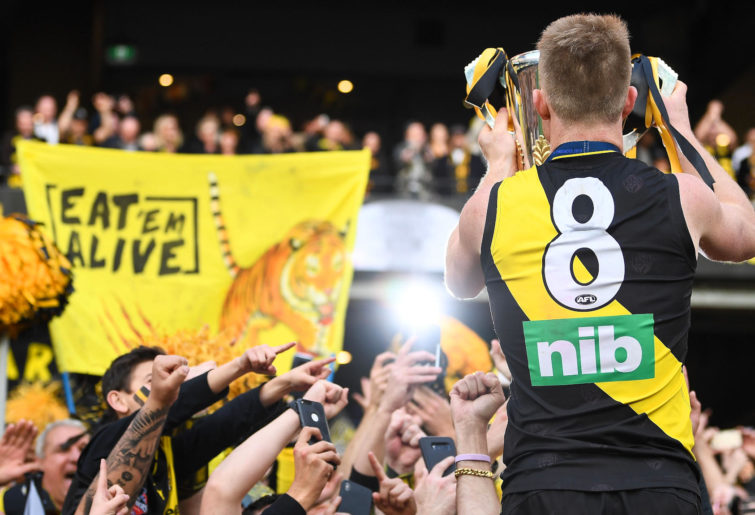
(Photo by Daniel Carson/AFL Photos via Getty Images)
Half forward – Shane Edwards
The arrival of Hardwick in 2010 resulted in Edwards enjoying a breakout campaign, playing every match for the season and finishing sixth in the Jack Dyer Medal. A fractured cheekbone in 2011 hampered his season slightly, but he returned in 2012 to kick a career-best 29 goals, becoming arguably Richmond’s smartest user of the ball. Edwards remained a consistent member of the Tigers’ best 22, performing well in the 2017 flag over the Crows. It led to an outstanding 2018 campaign, with Edwards named in the All Australian side for the first time. With injuries to some of Richmond’s senior members in 2019, Edwards captained the club in their absence for seven matches, leading the side to six wins. He came runner-up in the best and fairest as he claimed his second premiership. With 208 games and 133 goals to his name from the decade, Edwards has not only been one of Richmond’s best across the period, but his numbers stack up among the elite across the competition.
Forward pocket – Jason Castagna
After joining the Tigers as a rookie at the end of 2014, Castagna had to wait until 2016 to make his senior debut. Having started out as a rebounding defender, Castagna reworked his game as a small forward. He played every match in a barnstorming 2017 campaign, kicking 26 majors and playing in Richmond’s premiership victory over Adelaide. He added another haul of 26 goals in the 2018 season, before a strong 2019 campaign that saw him kick 27 goals and finish in the top ten of the best and fairest for the first time. He played in his second premiership, infamously kicking five behinds without a goal.
Full forward – Tyrone Vickery
A top-ten draft selection from 2008, Vickery took until 2011 to become a senior regular in the Richmond line-up, kicking an impressive 36 goals playing as a back-up ruckman, resulting in a top-five finish in the best and fairest. After just nine games in the 2012 season due to injury, Vickery bounced back to play 21 games in 2013, booting 27 goals, including two majors in the Tigers’ elimination final loss to Carlton. Vickery only managed 12 games in 2014, but was potent when on the field, slotting 23 majors. He added a further 31 goals to his tally in 2015, kicking a career-high six majors in a game against Collingwood. However, Vickery began to fall out of favour with the Tigers, leading to his departure to Hawthorn at the end of 2016 after 110 games and 153 goals in the decade.
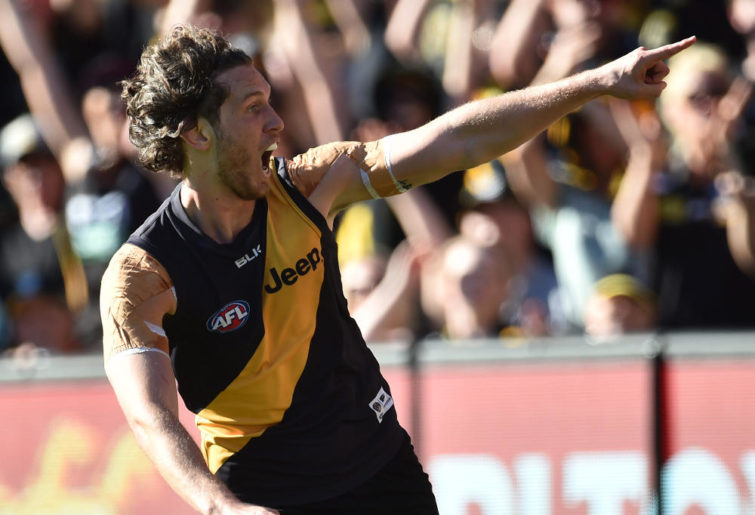
(AAP Image/Julian Smith)
Forward pocket – Josh Caddy
The combative Caddy joined Richmond as his third club at the end of 2016 after stints with Gold Coast and Geelong. He enjoyed a productive first season in the yellow and black, playing 22 games and booting 21 goals as he claimed the first premiership of his career. Playing a full-time forward role in 2018 resulted in Caddy having a career-best season, kicking 46 majors. The arrival of Tom Lynch in 2019 saw Caddy spend more time in the midfield, but he missed seven games through injury. After returning to the side via the VFL late in the season, Caddy was an honest contributor in the finals series, playing in the Tigers’ flag victory over the Giants.
Ruckman – Ivan Maric
It was a tough call to make between Maric and two-time premiership ruckman Toby Nankervis, but the former Crow’s efforts and leadership during his 80 matches in five seasons gets him the nod. Maric enjoyed a stunning rise in form in his first year with the Tigers in 2012, finishing third in the Jack Dyer Medal. After another strong campaign in 2013, Maric missed nine matches in 2014, bouncing back to miss just one game in 2015, a year in which he was joint vice-captain of the club. He fell out of favour during Richmond’s poor 2016 campaign, playing just three games, but despite speculation that he would retire, Maric instead signed on for a further year. He didn’t feature in the Tigers’ premiership campaign of 2017, instead leading the reserves to a grand final of their own before hanging up the boots.
Ruck rover – Dustin Martin
Eyebrows were raised when a teenage Martin walked in the doors at Punt Road at the start of the decade. The neck tattoos and unique hairstyle only added to the lofty expectations on the gun youngster, who was drafted at pick three at the end of 2009. Martin showed his unbelievable potential right from the start, finishing in the top five of the Jack Dyer Medal in his first two years. After some off-field indiscretions in 2012, Martin was guided by former Port Adelaide coach Mark Williams, leading to an increase in form. At the end of 2013, a year in which he came second in the best and fairest, the out-of-contract Martin famously toured the GWS Giants’ facilities, but ultimately re-signed with Richmond. Despite the controversy surrounding his contract, Martin responded in fine fashion, finishing third in the Jack Dyer Medal. He went to even greater heights in 2015, finishing runner-up in that award while also polling a then-career-best 21 Brownlow Medal votes to finish seventh. Despite the Tigers tumbling down the ladder in 2016, Martin took his game to another level, winning the club best and fairest and gaining All Australian honours for the first time, while he claimed a podium finish on Brownlow night.
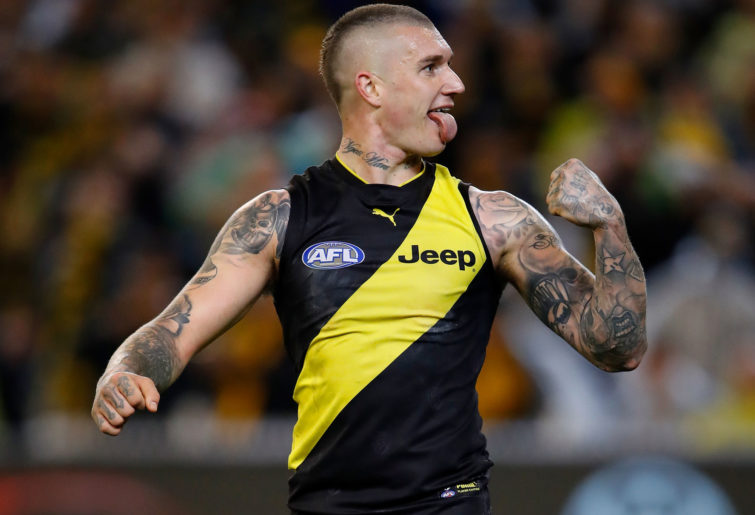
(Adam Trafford/AFL Media/Getty Images)
Martin continued to improve in 2017, another out-of-contract year. He blitzed the field, polling an incredible 36 votes to take home the Brownlow, while he went back-to-back with the club best and fairest and All Australian selection. Martin was named the champion player of the year in both the eyes of the coaches and the players, before capping off an unbelievable campaign with a best on ground performance in Richmond’s premiership win over Adelaide, claiming the Norm Smith Medal. Martin failed to scale the same heights a year later, but he still performed well enough to win All Australian selection for a third consecutive season, finishing equal sixth in the Brownlow. He closed out a remarkable decade with another premiership and yet another Norm Smith Medal, becoming just the fourth player in VFL/AFL history to be best on ground in two grand finals. With 224 games, 250 goals and 176 Brownlow votes from the decade, Martin will go close to being the best ever Tiger to pull on the famous yellow and black jumper.
Rover – Kane Lambert
After being overlooked in the 2009 draft, Lambert was given a lifeline by the Tigers at the age of 23, taken as a rookie at the end of 2014. The former Williamstown midfielder debuted early in the 2015 season, but a serious shoulder injury saw him miss nearly three months of action. Upon his return, Lambert solidified a position in Richmond’s best 22. With the Tigers struggling in 2016, so did Lambert’s form. However, with Richmond rocketing up the ladder in 2017, Lambert put in a brilliant campaign, finishing third in the Jack Dyer Medal as he became an AFL premiership player. He went to a greater level in 2018, coming runner-up in the best and fairest and polling a personal-best 12 Brownlow Medal votes. Lambert was a key contributor for the Tigers as they claimed a second flag in three years in 2019. His 95 games and 61 goals from the decade is a huge vote of confidence for clubs to take a chance and recruit star performers from the second-tier leagues across the country.
Interchange – Dion Prestia
The arrival of Prestia from the Gold Coast in 2017 coincided with Richmond’s resurgence in form, with the ex-Sun playing a vital role in the Tigers’ premiership. After achieving a top-ten finish in the Jack Dyer Medal in his first season at the club, Prestia endured an injury-interrupted campaign in 2018. A strong finish to that season set Prestia up for a personal-best year in 2019, winning a best and fairest in a premiership year as he became a two-time flag winner.
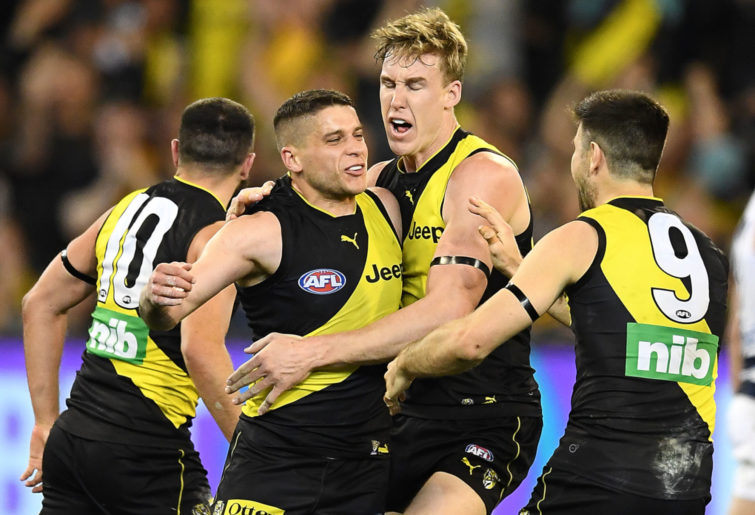
(Quinn Rooney/Getty Images)
Interchange – Reece Conca
A surprise selection at pick six in the 2010 national draft, Conca played 17 matches in his debut season, earning Richmond’s best first-year player award. He was a regular member of the Tigers’ best side in the early years of the decade, but injury would ravage his career over the 2015 and 2016 seasons. Conca managed just six appearances in 2017 as Richmond became a premiership contender, helping lead the reserves side to a grand final appearance. He returned with a solid campaign in 2018, but a shock loss to Collingwood in the preliminary final again thwarted his chance to become a premiership player. After 104 games across eight seasons, Conca departed the Tigers as a free agent.
Interchange – Daniel Jackson
A popular member of the Richmond line-up, Jackson achieved a top-ten finish in the Jack Dyer Medal in 2010 despite playing just 14 matches, highlighting his importance to a young Tigers’ midfield. The 2013 season saw Jackson become more of an attacking midfielder, booting a personal-best 18 goals across the season as Richmond returned to finals action. Jackson was rewarded with his efforts, named the club best and fairest for the first time. A year later, Jackson bowed out of the game, citing continual injuries taking a toll on his body.
Interchange – Daniel Rioli
The talented forward with the prodigious name, Rioli joined the Tigers as a first-round draft pick at the end of 2015. After being named Richmond’s best first-year player in 2016, Rioli quickly rose to stardom in 2017, starring in the club’s premiership campaign as he played every game. A personal highlight was in Round 3 against West Coast, with Rioli kicking an impressive goal from the boundary that was later judged the goal of the year. He missed the first half of the 2018 season, returning to feature in the Tigers’ finals push. Rioli was a key member of Richmond’s 2019 campaign, finishing in the top ten of the club best and fairest for the first time as he became a two-time premiership player.
Are the Tigers placed better or worse going into the new decade compared to ten years ago?
No club has undergone a transformation as impressive as the Tigers in the years of the decade. From being an on-field basket case to a mentally fragile side who couldn’t cope with the pressure of finals, Richmond finished the decade as the prevailing juggernaut of the AFL with a membership base in excess of 100,000. It’s a credit to coach Damien Hardwick, who came incredibly close to losing his job halfway through the decade. The decision to stick with him, as well as with gun goal-kicker Jack Riewoldt and superstar midfielder Dustin Martin, will go down as history-changing for the Richmond Football Club, and there is a genuine chance to create a Tigers dynasty heading into 2020 and beyond.







































































































